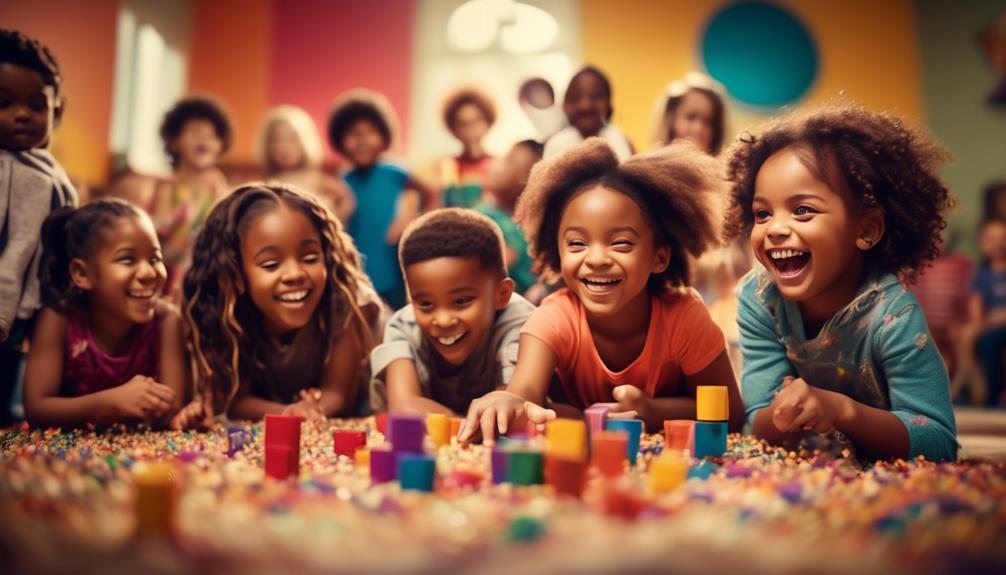Encouraging Positive Social Interactions Among Preschoolers

Preschool is a critical time for developing social skills, as it sets the foundation for future relationships and interactions. Here are some strategies that can be used to encourage positive social interactions among preschoolers:
- Create a Positive and Inclusive Environment:
- Foster a welcoming and inclusive atmosphere where all children feel valued and included.
- Display positive behavior and encourage children to do the same.
- Use positive reinforcement and praise to acknowledge and reward children's positive interactions.
- Teach and Model Social Skills:
- Teach preschoolers basic social skills such as sharing, taking turns, and listening to others.
- Model appropriate behavior and interactions for the children to observe and imitate.
- Use role-playing activities to practice social skills in a safe and controlled environment.
- Encourage Cooperative Play:
- Provide opportunities for preschoolers to engage in cooperative play activities.
- Set up centers or stations where children can work together on a task or project.
- Guide children in resolving conflicts and encourage them to communicate and problem-solve together.
- Promote Empathy and Understanding:
- Teach preschoolers the importance of empathy and understanding towards others.
- Read books or tell stories that highlight empathy and discuss the characters' feelings.
- Encourage children to express their emotions and help them understand how their actions can impact others.
- Facilitate Communication:
- Create opportunities for preschoolers to communicate and interact with each other.
- Plan group activities that require children to work together and communicate effectively.
- Teach children active listening skills, such as making eye contact and responding appropriately.
By implementing these strategies, educators and parents can promote positive social interactions among preschoolers, helping them develop important skills that will benefit them throughout their lives.
Key Takeaways
- Foster a welcoming and inclusive atmosphere
- Teach and model social skills
- Encourage cooperative play
- Promote empathy and understanding
Setting the Stage for Social Success
Setting the stage for social success in preschoolers is crucial for their overall development and future interactions with others. As caregivers and educators, it's our responsibility to create an environment that fosters positive social interactions and helps children learn the importance of setting boundaries and using positive reinforcement.
Imagine a classroom filled with eager preschoolers, each with their own unique personalities and temperaments. They're like sponges, ready to soak up every experience and learn from it. By setting clear boundaries, we're providing them with a sense of structure and security. Children thrive when they know what's expected of them and what's considered acceptable behavior. It's through these boundaries that they learn to respect others and themselves.
But setting boundaries alone isn't enough. We must also provide positive reinforcement when children display appropriate social behaviors. Whether it's sharing a toy, using kind words, or taking turns, acknowledging and praising these actions helps reinforce the idea that positive social interactions are valued and rewarded. This not only boosts their self-esteem but also encourages them to continue engaging in these behaviors.
Promoting Cooperative Play
Imagine a world where sharing and taking turns, teamwork and collaboration, and problem-solving together were the building blocks of every child's playtime.
Picture the joy and fulfillment that would come from working together towards a common goal, supporting and encouraging one another every step of the way.
Sharing and Taking Turns
As young children navigate their early social interactions, promoting cooperative play through sharing and taking turns becomes essential in cultivating harmonious relationships and building essential life skills.
It's through sharing activities and turn taking games that children learn the importance of empathy, patience, and compromise. By engaging in sharing activities, such as passing around a toy or sharing snacks, children develop a sense of generosity and learn to consider the needs and wants of others.
Turn taking games, on the other hand, teach children the importance of waiting their turn, listening to others, and respecting boundaries. These activities not only foster cooperation and teamwork, but also instill values of fairness and equality.
Teamwork and Collaboration
Cooperation and collaboration are the key ingredients to fostering a vibrant and inclusive preschool environment. In order to encourage teamwork and collaboration among preschoolers, engaging them in team-building activities and group projects is essential.
Team-building activities help preschoolers develop important social skills, such as communication, problem-solving, and empathy. Through these activities, children learn how to work together towards a common goal, respecting each other's ideas and opinions. This promotes a sense of belonging and unity within the group, while also fostering a supportive and cooperative atmosphere.
Group projects provide opportunities for preschoolers to collaborate and share responsibilities. By working together, they learn the value of teamwork and the power of collective effort. Group projects also enhance their creativity and critical thinking skills, as they learn from each other's perspectives and ideas.
Problem-solving Together
Building on the foundation of teamwork and collaboration, preschoolers can further enhance their social skills by engaging in problem-solving together, promoting cooperative play. By encouraging collaborative problem solving, children learn the importance of working together to find solutions.
Here are two key ways in which problem-solving together can benefit preschoolers:
- Developing empathy: When children engage in group decision making, they learn to consider the perspectives and feelings of others. This fosters empathy and understanding, allowing them to develop strong interpersonal skills.
- Building resilience: Problem-solving together teaches preschoolers the importance of perseverance and resilience. They learn that not every solution will work, but through trial and error, they can find alternative approaches. This builds their problem-solving skills and helps them navigate challenges in a positive and constructive way.
Teaching Empathy and Kindness
Teaching empathy and kindness is a transformative journey that opens young hearts to the power of compassion and connection. It is a vital aspect of fostering positive social interactions among preschoolers. By teaching compassion, we instill in them the value of understanding and caring for others. Through promoting friendship, we encourage them to build strong and meaningful relationships that bring joy and support into their lives.
To effectively teach empathy and kindness, we can utilize various strategies that engage their young minds and hearts. One powerful method is storytelling. By sharing stories that highlight acts of kindness and empathy, we help children understand the impact of their actions on others. We can also engage them in role-playing activities, where they can step into the shoes of others and experience the feelings and emotions of someone in need.
Furthermore, incorporating a table can enhance the learning experience for preschoolers. Here is an example:
| Activity | Description | Benefits |
|---|---|---|
| Random Acts of Kindness | Encourage children to perform small acts of kindness, such as sharing toys or helping a friend in need. | Promotes empathy, fosters a sense of community and cooperation. |
| Empathy Exercises | Engage children in activities that require them to identify and understand the emotions of others. | Enhances emotional intelligence and empathy skills. |
| Gratitude Circle | Create a daily routine where children express gratitude for the people and things in their lives. | Cultivates a positive mindset and appreciation for others. |
Teaching empathy and kindness to preschoolers is a transformative journey that not only benefits them but also the broader community. By equipping them with these essential skills, we are nurturing compassionate individuals who will go on to make a positive impact in the world. Let us embark on this journey together and sow the seeds of empathy and kindness in the hearts of our little ones.
Encouraging Communication Skills
Encouraging effective communication skills in preschoolers is like unlocking the door to a world where their thoughts and ideas can be shared, understood, and valued by others. It's a crucial aspect of their development that lays the foundation for building relationships and navigating the complexities of the social world.
To help preschoolers enhance their communication skills, you can employ the following strategies:
- Engage in active listening: Show genuine interest in what the child has to say and provide them with your undivided attention. This will encourage them to express themselves more freely and feel valued.
- Encourage verbal and nonverbal communication: Teach them to use words to express their thoughts and feelings, and also promote the use of nonverbal cues such as body language and facial expressions to enhance their communication skills.
Fostering Inclusion and Acceptance
Creating a welcoming and inclusive environment is the key to nurturing positive social interactions among preschoolers. As an educator, you have the power to promote diversity and foster friendships among your young students. By embracing and celebrating the unique qualities and backgrounds of each child, you can create an atmosphere of acceptance and understanding.
One way to foster inclusion is by incorporating activities that encourage children to learn about different cultures and traditions. For example, you can organize a 'Culture Day' where each child gets to share something special about their heritage. This not only promotes diversity but also helps children appreciate and respect different backgrounds.
Another important aspect of fostering inclusion is teaching children about empathy and kindness. Encourage them to befriend classmates who may feel left out or lonely. Teach them to listen, understand, and appreciate the perspectives and experiences of others. By doing so, you're helping them develop important social skills that will benefit them throughout their lives.
Additionally, it's crucial to create opportunities for collaboration and teamwork. Group projects and games can help children build relationships and learn that everyone's contributions are valuable. By encouraging cooperation and mutual respect, you're fostering an inclusive environment where every child feels valued and included.
Building Conflict Resolution Skills
As the preschoolers continue to embrace diversity and foster positive social interactions, it's important to equip them with essential conflict resolution skills. Conflict is a natural part of life, and learning how to resolve it peacefully is a crucial skill that will serve them well throughout their lives. By teaching them effective conflict resolution strategies and peer mediation techniques, we can empower these young minds to navigate disagreements in a respectful and compassionate manner.
Here are some key strategies to help preschoolers build their conflict resolution skills:
- Active Listening: Encourage children to listen attentively to one another, showing empathy and understanding. Teach them to repeat what the other person has said to ensure clear communication.
- Problem Solving: Guide them in brainstorming solutions that are fair to all parties involved. Encourage them to think creatively and find win-win outcomes.
And here are some peer mediation techniques that can be beneficial:
- Taking Turns: Teach the importance of taking turns during conversations and allowing each person to express their thoughts and feelings uninterrupted.
- Using 'I' Statements: Encourage preschoolers to use statements starting with 'I feel' or 'I think' to express themselves instead of blaming or accusing others.
Creating a Positive and Supportive Environment
Imagine stepping into a preschool classroom where the arrangement is carefully thought out to promote positive social interactions. The tables are arranged in clusters, creating small groups where children can easily interact and collaborate.
The materials are organized and accessible, encouraging exploration and creativity. This intentional setup fosters a supportive environment where children can learn and grow together.
Additionally, social-emotional learning is woven into the daily routine, with teachers guiding children in developing empathy, problem-solving skills, and effective communication.
Classroom Arrangement
To create a positive and supportive environment in your preschool classroom, consider the arrangement of the space to facilitate positive social interactions among the children. A well-organized classroom can make a world of difference in promoting healthy relationships and fostering a sense of belonging.
Here are some key points to consider:
- Classroom Organization:
- Ensure that materials and resources are easily accessible for all children.
- Create designated areas for different activities, such as reading corners, art stations, and sensory play areas.
- Display visual cues, such as labels and pictures, to help children navigate and find what they need.
- Spatial Arrangement:
- Arrange furniture and learning centers in a way that encourages collaboration and interaction.
- Create small group areas where children can engage in cooperative play and problem-solving together.
- Designate quiet spaces where children can retreat to when they need some alone time.
Social-Emotional Learning
With a well-organized classroom that promotes positive social interactions, you have set the stage for fostering social-emotional learning and creating a supportive environment for your preschoolers. Social-emotional learning is a crucial aspect of their development, as it helps them build emotional intelligence and self-awareness. By nurturing these skills, you empower your students to understand and manage their emotions, develop empathy, and establish healthy relationships.
Imagine a classroom where children are encouraged to express their feelings openly and respectfully. Picture a space filled with opportunities for collaborative play and problem-solving. Envision a supportive environment where children are taught to recognize and regulate their emotions, and where conflict resolution is approached with empathy and understanding.
Incorporating social-emotional learning into your classroom not only benefits your preschoolers now but also equips them with essential skills for the future. By fostering emotional intelligence and self-awareness, you're helping them develop the foundation for lifelong success in their relationships and overall well-being.
Frequently Asked Questions
How Can Parents Reinforce Positive Social Interactions at Home?
You can reinforce positive social interactions at home by creating opportunities for your preschooler to interact with others, praising and modeling good behavior, and incorporating activities that promote sharing, taking turns, and empathy.
What Are Some Common Challenges That Preschoolers Face When It Comes to Socializing?
Common challenges preschoolers face when socializing include shyness, difficulty sharing, and lack of empathy. To reinforce positive interactions, encourage role-playing, teach empathy through stories, and provide opportunities for cooperative play.
Are There Any Specific Activities or Games That Can Help Preschoolers Develop Cooperative Play Skills?
You're wondering about activities or games to help preschoolers develop cooperative play skills. Well, there's a whole world of fun waiting! Cooperative play activities and group problem-solving games are perfect for fostering teamwork and social skills. Let's dive in!
How Can Teachers Address Bullying or Exclusion Among Preschoolers?
To address bullying and promote inclusion among preschoolers, teachers can create a safe and supportive environment where children feel valued and respected. By teaching empathy, conflict resolution, and fostering positive relationships, teachers can help prevent and address instances of bullying and exclusion.
Are There Any Specific Strategies for Promoting Empathy and Kindness in Preschoolers With Special Needs?
To promote empathy and kindness in preschoolers with special needs, you can try incorporating strategies like modeling positive behavior, using visual aids, and creating inclusive activities. It's important to create an environment where everyone feels valued and supported.











